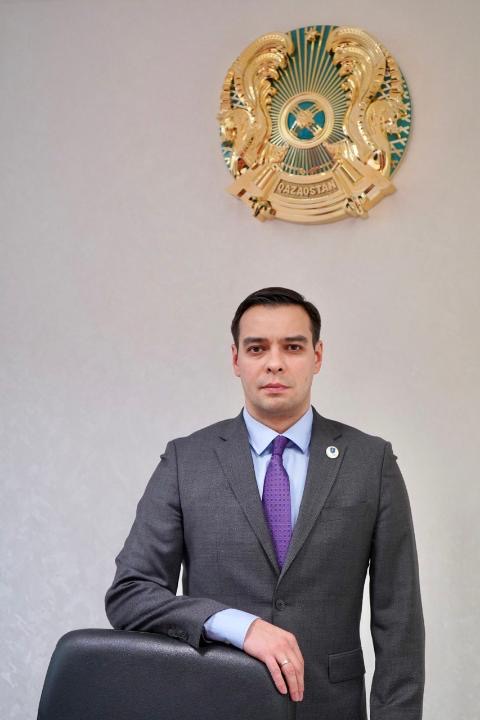ASTANA – The recently enacted law that tightens punishment for torture is an extension of Kazakhstan’s ongoing legal reforms directed to combat the deliberate targeting of civilians and torture, said Kazakhstan’s Human Rights Commissioner Artur Lastayev in an interview with Kazakhstanskaya Pravda newspaper on March 22 ahead of the Right to Truth Day.

Artur Lastayev, Kazakhstan’s Commissioner for Human Rights. Photo credit: gov.kz.
This day is observed internationally on March 24 to honor the memory of victims of human rights violations and promote the importance of the right to truth and justice.
As another step towards preventing human rights violations as part of Kazakhstan’s commitment to international treaties on human rights, President Kassym-Jomart Tokayev signed in March a law to prevent torture and other cruel, inhuman, or degrading treatment and expand the rights of prisoners. The aim is to secure stronger protection of human rights and freedom in Kazakhstan.
“Within the context of the ongoing political and legal reforms in the country, the signed law is a continuation of the consistent steps taken by Kazakhstan to eradicate torture and other forms of ill-treatment, to include international norms on these issues in the national legislation, expand the rights of prisoners, and prevent the formation of a negative prison subculture,” said Lastayev.
“Stricter penalties and other statutory measures are aimed at eradicating this [torture]. Nobody, including law enforcement agencies, should use such barbaric methods,” he added.
Since the beginning of the year, the commissioner’s office received 807 requests, 127 of which are related to torture.
“We investigate every complaint along with the relevant government agencies, trying to protect human rights even when they are not legally violated,” said Lastayev.
“As of this year, prosecutors have been given the exclusive right to investigate criminal cases of torture. Additionally, our national clinical protocol has been aligned with the Istanbul principles. The provision of medical services has now been transferred from the prison administration to the Ministry of Healthcare. All these measures will contribute to the effective eradication of torture in Kazakhstan,” he said.
Lastayev also mentioned the preventive mechanism, which gives the commissioner the right to make unimpeded and unannounced visits to prison institutions and organizations providing special social services.
“The rules for preventive visits have been recently amended. We now have the right to conduct periodic, special, and thematic visits to combat torture more effectively,” he added.
“Given that the ombudsperson’s office now has representative offices in the regions, we are closer to the public, more mobile, and accessible. The dynamics suggest that there will be more complaints. If in 2021 the ombudsperson received 1,800 complaints, over just the last two months there have already been more than 800,” said Lastayev.
Kazakhstan has also ratified the conventions on the protection of the rights of refugees and stateless persons. These international acts prohibit the extradition, deportation, or expulsion of persons who may be subjected to the threat of torture or persecution on various grounds.
“Given the current geopolitical situation in the world, certain work is being done to prevent such cases. (…) We propose amendments and additions to the relevant legislative acts, as well as in the law enforcement practice, to refrain from expulsion of persons,” he said.
Commenting on the recent parliamentary election, Lastayev said his office supports President Tokayev’s reforms, which aim to “further strengthen not only human rights but also democratic society.”
“As part of its human rights function, our institute monitored the electoral process. I believe that all the conditions for fair political competition have been created. Now, everything depends on those elected by the people of Kazakhstan,” said Lastayev.
Regarding the Constitutional Court, which was re-established following the national referendum last year and began its work this year, Lastayev said the ombudsperson’s office can apply to the court to ensure compliance with the Constitution of the country’s regulatory legal acts affecting the constitutional rights and freedoms of citizens, although no cases have been raised yet.
Outlining the challenges that remain in Kazakhstan, Lastayev pointed to domestic violence.
“We are in favor of criminalizing such acts [domestic violence], but to avoid repeating past mistakes, these should be cases of private-public prosecution, where law enforcement agencies would be the ones to collect evidence of the aggressor’s guilt, not the victim,” he said.
“In addition, we sent recommendations to law enforcement on the issue of presumption of innocence. As we know, a person must be considered innocent until a guilty verdict is given. This also applies to the publication or distribution of press releases by pre-trial investigation agencies on citizens who are only suspected of committing any crimes,” added Lastayev.
